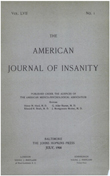FURTHER LABORATORY STUDIES ON URIC ACID IN NEURASTHENIA, AND ON AUTOINTOXICATION IN NERVOUS DISEASE
Abstract
In the foregoing studies made with especial reference to the search for evidence of cause or effect in certain cases of neurasthenia, I have sought to trace the significance of the uric acid by-product especially as an index to disturbed metabolism. The writer feels that in this wide variation of excretion, thus determined, of so important an end-product as uric acid resulting from combustion in the human body, we have sufficient data to say positively that neurasthenic conditions are associated with the circulation of such an irritant in the blood. From the observations of Haig, it seems clearly, proven also that when the uric acid elimination is decreased, the urea elimination is normally increased. The amount of elimination of urea is in proportion to the albuminous food products properly absorbed into the blood, thus giving rise to strength and a feeling of latent vigor in the system so nourished. On the other hand there assuredly follow a sense of feebleness and lack of resistance when the uric acid elimination goes above the normal and in consequence the urea elimination falls. As experimentation in the laboratory has proven that in health there is no such variability in the excretion of uric acid by the kidneys—an important fact shown in all of my studies—there is but one conclusion to be drawn from this persistent evidence; namely, that physiological absorption of proteids is inhibited in an irregular fashion in the neurasthenic subject; or else the condition is due to want of proper vaso-motor control of the capillary blood-vessels, thus permitting an irregular and improper elimination of uric acid, etc. From all this evidence presented, and with the weight of symptoms of vital phenomena so patent to every physician in nervous exhaustion states, it must needs be that in such central disease the central energizing influence (of the neuronic vitality, per se) is greatly enfeebled and is unable to carry this weakened vital action through the nerves to the organs of digestion and absorption. This vicious circle of disturbed metabolism being established, we have secondary irritations continuously operating on the already devitalized nerve centres. The great system of organic life, the sympathetic thus also becomes overexcited and in a condition of irritable weakness as manifested in the resultant symptomatology of neurasthenia.
The gist of these studies leads back to the search for the initial cause of essential neurasthenia; but when such a condition is once established, it is always certain that excretion of end-products will vary irregularly and widely.
These observations are in concordance with the idea of nutritional basis as the essential element in the cure of neurasthenia. From a closer attention to dietetics, especially the study of the individual idiosyncrasies of the case, we may hope to gain the best results in the treatment of this disease so prevalent in America. That there are other irritants taken in from without the body as in the absorption of toxines from the gastro-intestinal tract, is also a fact the writer has proved to his satisfaction recently in another place.10 It is hoped with this scientific evidence before us of the causa, morbi, a more definite stand will be taken by the neurologist as to the artiology of this disease and that more and more cases will be considered what might be properly termed organic in nature, secondary to an initial functional disturbance, albeit the microscope may be as yet unable to determine changes in the nerve cells themselves.
The influence of change of scene should be fully weighed in the management of this subtle disease, but must be associated with nutritional measures, if we wish the "summum bonum" of success for treatment. Again, hydrotherapy is of paramount importance, especially in bringing about a stimulation of the digestive processes through reflex action.
The valuable little work of Haig on "Diet and Food in Relation to Strength and Power of Endurance" can not be too highly extolled from the scientific view, which in part has been in this composite paper, deducted and fortified.
Access content
To read the fulltext, please use one of the options below to sign in or purchase access.- Personal login
- Institutional Login
- Sign in via OpenAthens
- Register for access
-
Please login/register if you wish to pair your device and check access availability.
Not a subscriber?
PsychiatryOnline subscription options offer access to the DSM-5 library, books, journals, CME, and patient resources. This all-in-one virtual library provides psychiatrists and mental health professionals with key resources for diagnosis, treatment, research, and professional development.
Need more help? PsychiatryOnline Customer Service may be reached by emailing [email protected] or by calling 800-368-5777 (in the U.S.) or 703-907-7322 (outside the U.S.).



